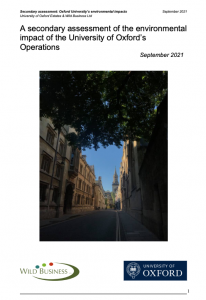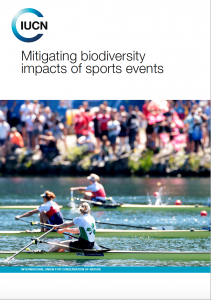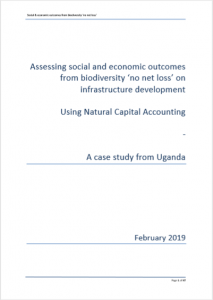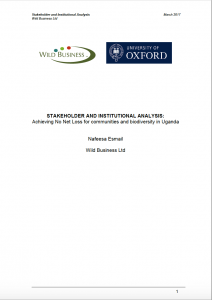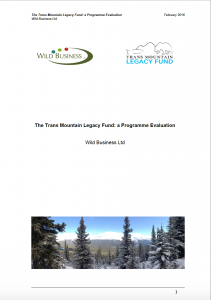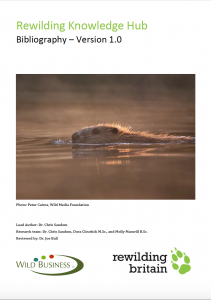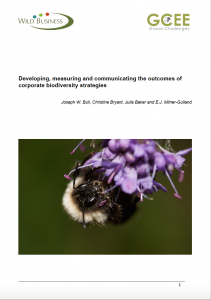Library of resources produced by Wild Business
In this section, we link to selected project reports produced by Wild Business. Note that only reports specifically intended by clients for the public domain are included here.
Unless otherwise specified in the report: (i) reproduction for educational and other non-commercial purposes is authorised without prior written permission from the copyright holder, provided the source is fully acknowledged; (ii) reproduction for resale or other commercial purposes is prohibited without prior written permission of the copyright holder.
Further, no scientific publications authored by the Wild Business team are included here; for those, please see our profiles on Google Scholar or contact us directly.
2021
Assessment of the environmental impact of the University of Oxford’s operations (with Oxford University Estates)
A groundbreaking study into the biodiversity impacts associated with a large organisation’s activities, including throughout the supply chains, resting upon the most up to date life cycle impact assessment literature. This was the second of two assessments, and was published online as Supplementary Information to the Nature article by Bull et al. (2022).
Biggs, E., et al. (2021) “A secondary assessment of the environmental impact of the University of Oxford’s operations ”. Wild Business Ltd for the University of Oxford; London, UK [available: here].
2020
Technical approaches for understanding and mitigating the biodiversity impacts of sports events (with the IUCN, and International Olympic Commission)
Sport is a major driver of change for both society and nature. However, the biodiversity impacts of sports events have not previously been comprehensively categorised, and technical mitigation solutions catalogued. In this report (for the IUCN, and International Olympic Commission), Wild Business worked with collaborators to do just that.
Brownlie, S., Bull, J.W., & Stubbs, D. (2020) “Mitigating biodiversity impacts of sports events”. IUCN; Gland, Switzerland [available: here].
2019
Applying the Natural Capital Assessment approach in the context of biodiversity ‘no net loss’: Uganda
The socioeconomic outcomes of major infrastructure development projects can be assessed using Natural Capital Accounting methodologies. However, this has not previously been attempted for development projects governed by a requirement to achieve ‘no net loss of biodiversity’. In this report, Wild Business associates Julia Baker and Milly Oakley carry out such an assessment for a hypothetical sugar cane factory in Uganda.
Baker, J. & Oakley, M. (2019) “Assessing social and economic outcomes from biodiversity ‘no net loss’ on infrastructure development, using Natural Capital Accounting – a case study from Uganda”. Wild Business Ltd; London, UK [available: here].
2017
Stakeholder analysis: a biodiversity offset for hydropower construction in Uganda
Large international development projects do not always meet the environmental and social standards technically required of them by funders such as the World Bank, especially when it is unclear who has responsibility for following up on commitments. Our study explores this problem for large hydropower projects in Uganda. The study was carried out by Nafeesa Esmail of Wild Business Ltd, contributing to a project led by the University of Oxford, UK.
Esmail, N. (2017) “Stakeholder and Institutional Analysis: Achieving No Net Loss for communities and biodiversity in Uganda”. Wild Business Ltd for University of Oxford; London, UK [available here].
2016
Programme evaluation: a biodiversity offset for pipeline construction in Canada
The Trans Mountain Legacy Fund, originally proposed in 2004, was established as part of the implementation of the Anchor Loop Pipeline Project in the forests of western Canada. The rationale for the creation of the Trans Mountain Legacy Fund was to ensure that, overall, Project activities resulted in a net benefit to the ecological integrity of the region. Regulators, resource managers, and environmental organisations both within Canada and further afield are increasingly considering the merits of biodiversity offset schemes with a similar focus on ecological integrity. As such, it was important to consider which elements of the Legacy Fund model were worth replicating for future biodiversity offset or net benefit type initiatives. The study was carried out by Joe W. Bull of Wild Business Ltd.
Bull, J.W., & Sandom, C.J. (2016) “The Trans Mountain Legacy Fund: a Programme Evaluation”. Wild Business Ltd; London, UK [available here].
The Rewilding ‘Knowledge Hub’
Rewilding has been described as the optimistic agenda for halting the decline in biodiversity and restoring a balanced suite of ecosystem services. But, it is a field that currently lacks a comprehensive and dedicated evidence base, raising the question: will it work? The Rewilding Knowledge Hub Bibliography, presented in this report, is a first effort to begin to collate, structure, and disseminate this knowledge to a broad audience to help develop the science and practice of rewilding.
Sandom, C.J., Clouttick, D., Manwill, M., Bull, J.W. (2016) “Rewilding Knowledge Hub: Bibliography – Version 1.0″. Produced by Wild Business Ltd for Rewilding Britain. Wild Business Ltd; London, UK [available here].
2015
Workshop report: corporate biodiversity strategies
This document reports on the outcomes of workshop discussions held between representatives of multinational corporations and leading academics, on the topic of developing, measuring and communicating the performance of corporate biodiversity strategies. We explain how the array of currently available resources is not yet fulfilling the requirements of companies seeking to implement corporate biodiversity strategies. The workshop was intended to explore whether and why this is the case, and to consider what can be done better to support companies in implementing biodiversity strategies.
Bull, J.W., Bryant, C., Baker, J. and Milner-Gulland, E.J. (2015) “Developing, measuring and communicating the outcomes of corporate biodiversity strategies”. Wild Business Ltd; London, UK [available here].

